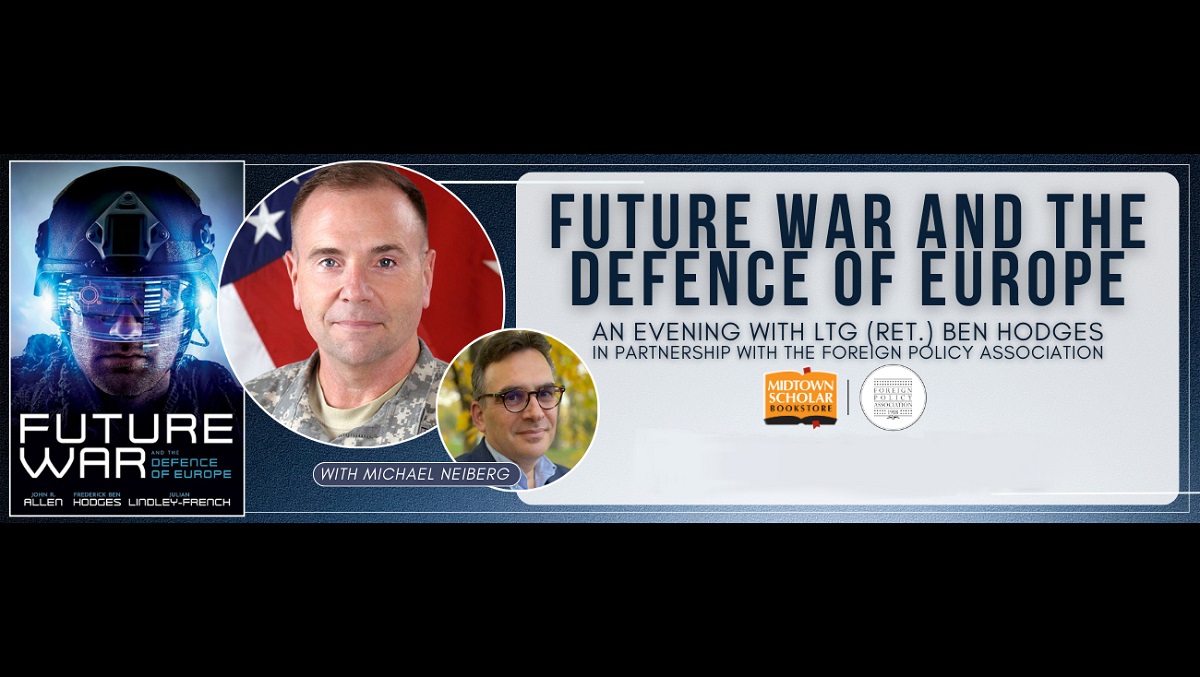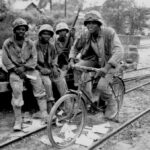
On August 8, 2024, retired Lieutenant General Ben Hodges, who served as the Commanding General of U.S. Army Europe from 2014 to 2017, visited Carlisle. Michael Neiberg had the pleasure of sitting down with him for a conversation about his latest book, Future War and the Defence of Europe. Their conversation was held at a public presentation at the Midtown Scholar Bookstore in Harrisburg, Pennsylvania.
We’re excited to share this bonus episode of their conversation with you, thanks to the generosity of the bookstore in sharing the audio recording of the event.
It’s still in our interest that Europe is stable, secure, and prosperous. The access that we gain, the intelligence sharing that we get from our allies — that’s our benefit. So it’s still worth it.
Podcast: Download
Frederick Benjamin “Ben” Hodges III is a retired United States Army officer who served as commanding general, United States Army Europe. He has been Senior Advisor to Human Rights First since June 2022 and also serves as NATO Senior Mentor for Logistics. He previously held the Pershing Chair in Strategic Studies at the Center for European Policy Analysis.
Michael Neiberg is the Chair of War Studies at the U.S. Army War College.
The views expressed in this presentation are those of the speakers and do not necessarily reflect those of the U.S. Army War College, U.S. Army, or Department of Defense.
Photo Credit: Midtown Scholar Bookstore





Russia, in the New/Reverse Cold War of today I believe, takes it cue from the Old Cold War of yesterday. Explanation:
In the Old Cold War of yesterday, the U.S. stood hard against the unwanted and threatening — and thus the disruptive and destabilizing — political, economic, social and value changes demanded by the communists and communism.
In the New/Reverse Cold War of today, nations such as Russia stand hard against the unwanted and threatening — and thus disruptive and destabilizing — political, economic, social and value changes demanded by the capitalists and capitalism.
In the Old Cold War of yesterday, the U.S./the West was able to “win;” this, when the USSR came under Gorbachev.
In the New/Reverse Cold War of today, Russia hopes to be able to “win;” this, if and when the U.S. once again comes under Trump.
In the Old Cold War of yesterday, when the USSR came under Gorbachev, the WARSAW Pact was soon done/finished.
In the New/Reverse Cold War of today, if the U.S. comes under Trump, the Russians hope that NATO will soon be done/finished.
(Thus, the reason for NATO — minus the U.S. — to “gird their loins” beforehand/in anticipation of this potential — “Russia wins in New/Reverse Cold War” scenario?)
If, as I suggest above, Russia, in the New/Reverse Cold War of today, is taking its cues from (I should have added “U.S. strategy and related efforts?”) of the Old Cold War of yesterday, then, accordingly, should we not look at Putin’s efforts in Ukraine — in the New/Reverse Cold War of today — this, in much the same way that we might have looked at Reagan’s efforts in Nicaragua — in the Old Cold War of yesterday? That is, in both such cases, from the perspective of “containment” and/or “roll back?”
Herein, in both the Nicaraguan case back then — and in the Ukrainian case today — the efforts made by Reagan and Putin respectively, these are to prevent a viable and attractive enemy-type state from either (a) coming to the fore on one’s doorstep — and/or — (b) remaining as a successful enemy-type state on one’s doorstep?
(The fact that Reagan might use such things as irregular warfare more to achieve these such objectives in places like Nicaragua in the Old Cold War of yesterday, and that Putin [and/or Xi?] might use such things as conventional and/or hybrid warfare more to achieve these such objectives in places like Ukraine [and/or Taiwan?] in the New/Reverse Cold War of today, this being MUCH LESS IMPORTANT(?), and indeed MUCH LESS RELEVANT(?), than is a proper understanding of what is actually going on in places like Ukraine [and Taiwan?] today and why?
In this regard, in the New/Reverse Cold War of today, I believe that we may be much better served; this, if we were to think of our opponents today as (a) taking their cues from our “containment” and “roll back” strategies, and related efforts, of the Old Cold War of yesterday.
(After all, are not WE the ones, post-the Old Cold War, who set out to achieve revolutionary political, economic, social and/or value change both in our own home countries and throughout the world? And are not WE the ones, post-the Old Cold War, who have, accordingly, faced a significant and sometimes dangerous degree of resistance — both here in our own home countries and there throughout much of the rest of the world — as to these such efforts?)
I have been a student of General Hodges and Dr. Neiberg for decades as a student of military history. General Hodges is correct that the paradigm has shifted from the Cold War until 1989 to information warfare and hybrid warfare. The Axis of Russia, China, North Korea, and Iran oppose the international rules-based order. The miscalculation of Putin and Russia in Ukraine began in 2014 when Russia, with the little green men, invoked hybrid warfare on Ukraine and seized Crimea unopposed and, in 2022, invaded Ukraine unprovoked to seize Kyiv in a matter of days or weeks. Putin believed that the people of Ukraine would fall into line and would not fight. Putin was wrong, and now Ukraine still fights for its sovereignty and freedom. The United States and NATO need to provide Ukraine with what it needs to win and drive Russia back to the internationally recognized 1991 border.
Another way of looking at — and indeed possibly confirming — my New/Reverse Cold War thesis above, this is by considering the following questions and answers:
Q1: In the Old Cold War of yesterday (1945-1989), when the Soviets/the communists (in their own home countries but also throughout much of the rest of the world) were the ones seeking to achieve revolutionary political, economic, social and/or value change (in that case, in the name of the communists and communism), who — both in their own homelands but also abroad — were the Soviets/the communists’ natural allies back then — and who — both in their own homelands but also abroad — were the Soviets/the communists’ natural enemies back then?
A1: In the Old Cold War of yesterday — both in their own home countries and indeed throughout much of the rest of the world — the natural allies of the Soviets/the communists were the more liberal/the more pro-change/the more progressive elements of the states and societies of the world. This while — back then and in both their own home countries and throughout much of the rest of the world — the natural enemies of the Soviets/the communists were the more conservative/the more traditional/the more no-change and/or reverse already realized but unwanted change elements of the states and societies of the world.
Q2: In the New/Reverse Cold War of today (1990-present), when the U.S./the West (in our own home countries but also throughout much of the rest of the world) have become the ones seeking to achieve revolutionary political, economic, social and/or value change (in our case, in the name of the capitalists and capitalism), who — both in our own homelands but also abroad — have been the U.S./the West natural allies re: these such objectives and who — both in our own homelands but also abroad — have been the U.S./the West natural enemies re: these such endeavors?
A2: In the New/Reverse Cold War of today — both in our own home countries and indeed throughout much of the rest of the world — the natural allies of the U.S./the West have been the more liberal/the more pro-change/the more progressive elements of the states and societies of the world. This while — during this period and both in our own home countries and throughout much of the rest of the world — the natural enemies of the U.S./the West have been the more conservative/the more traditional/the more no-change and/or reverse already realized but unwanted change elements of the states and societies of the world.
(Note: In the Old Cold War of yesterday, with the U.S./the West doing containment and roll back then, when it served our interests, we positioned ourselves as the champions/the protectors of such things as traditional social values, beliefs and institutions. In the New/Reverse Cold War of today, and with Russia and China doing containment and roll back now, we should note that, when it serves their interests, Russia and China position themselves as the champions/the protectors of such things as traditional social values, beliefs and institutions. From an overall perspective, thus, if it walks, talks, quacks, etc., like a duck [to wit: like a New/Reverse Cold War] should we not acknowledge same?)